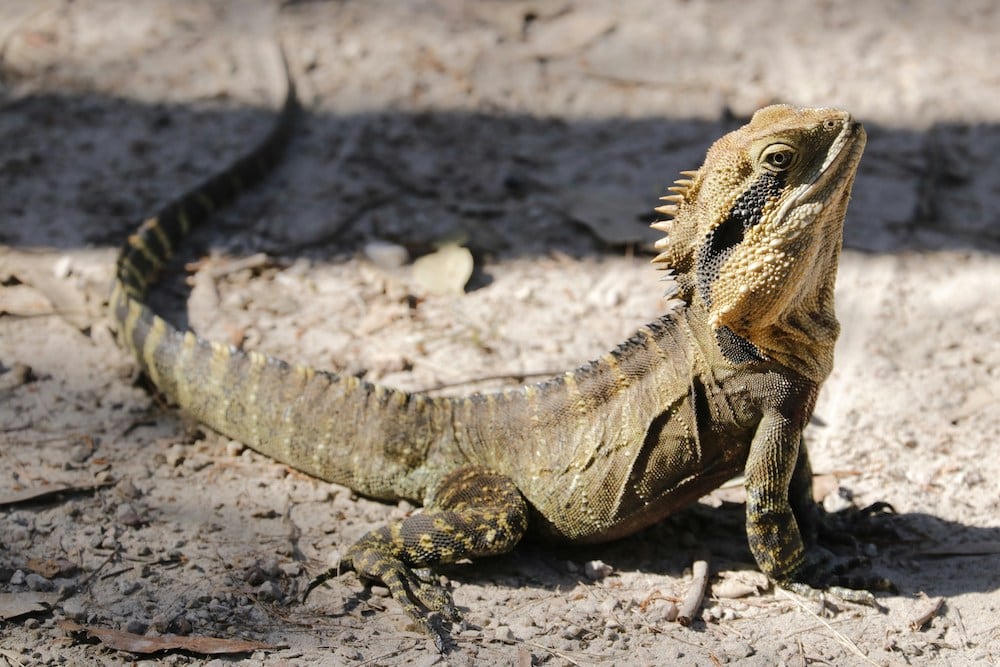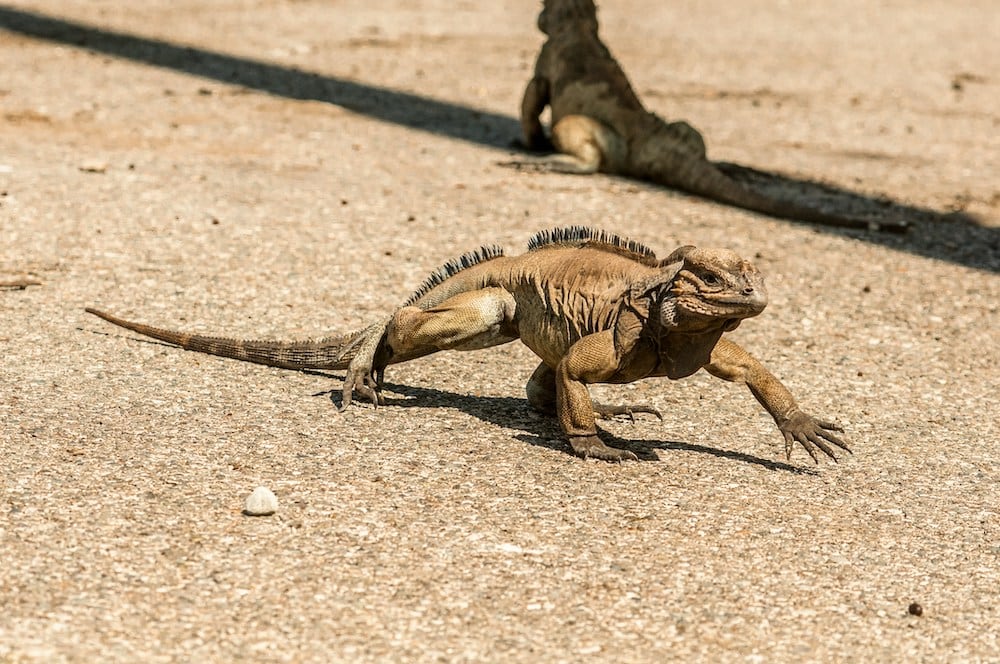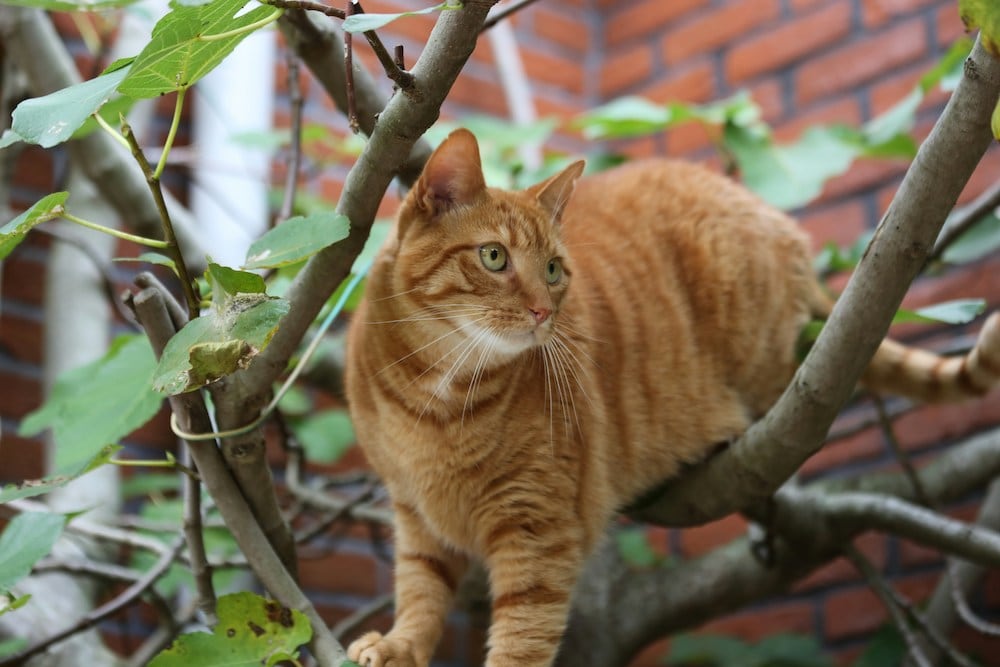While it’s possible for these two very different animals to coexist peacefully, there are significant risks to be aware of. For one thing, iguanas may bite. Iguanas have sharp claws, leave droppings, carry salmonella, and strong tails that can cause injuries to curious cats.
Despite iguanas being generally docile, their defensive mechanisms can lead to aggressive behavior if they feel threatened. Cats, by nature, are predators and their instinctive curiosity can spell trouble in interactions with iguanas. As a precaution, pet owners need to be vigilant and understand the dynamics between these species to prevent potential conflicts.
Understanding Iguanas and Cats as Distinct Species
Iguanas and cats are vastly different in their behaviors and physiological makeups. Understanding these differences is key to navigating their interactions and potential cohabitation.
Behavioral Patterns of Iguanas and Cats
Iguanas are typically docile creatures, but they can exhibit aggressive behavior if they feel threatened. They are often solitary animals preferring quiet and warmth. Iguanas communicate through body language such as head bobs and tail whips.
Cats, in contrast, are curious and independent. They have a wide range of vocal communications such as meows, purrs, and hisses. Cats are known for their agility and hunting instincts, which can be triggered by small, fast-moving creatures, including iguanas.
Important Behaviors of Each Species:
- Iguanas:
- Solitary
- Communicate via body language
- Prefer warmth
- Cats:
- Curious and independent
- Vocal communicators
- Agile hunters
Physiology: Iguanas vs. Cats
Physiologically, iguanas and cats are very distinct. Iguanas are reptiles, characterized by their cold blood, scales, and need for basking under lamps to regulate their body temperature. They have powerful tails and sharp claws.
Cats, as mammals, are warm-blooded and have fur to maintain body heat. Their retractable claws and acute vision are adaptations for hunting. Cats’ diets are primarily carnivorous, while iguanas are mostly herbivores, requiring fresh vegetables and specific supplements to stay healthy.
Key Physiological Attributes:
- Iguanas:
- Cold-blooded
- Scaled skin
- Sharp claws, powerful tails
- Cats:
- Warm-blooded
- Fur-covered
- Retractable claws, sharp senses
Understanding these inherent differences can help pet owners create a safe, harmonious environment for both iguanas and cats.

The Interaction Between Iguanas and Cats
Cats and iguanas each have unique behaviors and instincts. Their interactions can be complex and require careful observation to ensure their coexistence is safe.
Territorial Behaviors and Their Implications
Cats are naturally territorial animals. They may view the introduction of an iguana into their territory as a threat. This can lead to aggressive behaviors, such as hissing, swatting, or stalking.
Iguanas, on the other hand, might become defensive if they feel their space is being encroached upon. An iguana’s sharp claws and strong tail can cause significant injury to a curious cat. Introducing both animals slowly and in controlled environments reduces potential conflicts.
Providing each pet with their own space, such as separate rooms or designated areas within a living space, helps minimize territorial disputes. Monitoring initial interactions and looking for signs of stress can prevent conflicts and help them adjust to sharing their environment more harmoniously.
Communicating Distress: Signs to Look For
Understanding distress signals is crucial in preventing serious confrontations between cats and iguanas. For cats, signs of distress include flattened ears, dilated pupils, low growls, and a tucked tail. These behaviors indicate that the cat feels threatened or uncomfortable.
Iguanas show distress through rapid tail movements, expanding their dewlap (throat skin), and making hissing sounds. They may also attempt to flee or become unusually still.
It’s essential to separate the animals if any distress signals are observed. Continual observation during interactions ensures that both animals remain safe.
Adjusting their interactions based on these cues allows for a safer shared environment, reducing the risk of harm to either pet.
Understanding the Hazards
Introducing cats to a place where iguanas live poses several risks. This section addresses potential dangers related to iguanas’ behavior and environmental attributes, and how these can affect cats as pets.
Environmental Considerations for Iguanas
Iguanas, generally docile, can become aggressive when threatened. Their sharp claws and teeth can inflict serious injuries on cats. Moreover, iguanas’ need for a warm and humid environment may clash with a cat’s preferences, potentially leading to health issues for both animals.
Cats, being natural hunters, might see iguanas as prey. This predatory instinct could lead to stressful encounters. Additionally, if an iguana feels cornered, it may lash out defensively, posing injury risks to the cat. It’s crucial for pet owners considering this mix to understand these environmental and behavioral dynamics.
To mitigate hazards, creating a safe space for your pet cat and monitoring their interactions closely is essential. Ensuring that your pet has their needs met can help in reducing potential conflicts and ensuring a safer environment.

Invasive, Wild Iguanas are a Danger to Cats
Invasive, wild iguanas pose a significant threat to domestic cats in various environments. These herbivorous reptiles use their sharp claws and teeth for defense, which can cause serious injuries to curious or aggressive cats. Such interactions can lead to distressing encounters, making it crucial for pet owners to understand the risks.
Understanding Invasive Iguanas
Invasive iguanas pose significant environmental threats and can disrupt local ecosystems.
The Spread of Invasive Iguanas
The spread of invasive iguanas has become a significant problem in regions like Florida and Puerto Rico. In Florida, the green iguana population has exploded, leading to environmental and infrastructural damage. They burrow into the ground, often causing damage to sidewalks, canal banks, and residential structures.
Areas affected have sought various iguana removal services to mitigate these issues. The cold spells in Florida occasionally put these populations at risk, but resilient iguanas have found ways to endure and continue spreading. In Puerto Rico, iguanas disrupt local agriculture and compete with native species, leading to calls for comprehensive management strategies.
Risks to Cats and Prevention Strategies
Iguanas pose various risks to domestic cats, especially in regions with significant wild iguana populations. It is crucial for cat owners to understand these dangers and implement effective prevention strategies to keep their pets safe.
Threats Posed by Iguanas to Cats
Wild iguanas can physically harm cats. Larger iguanas have powerful tails and claws, which they use defensively against perceived threats. These reptiles can deliver painful bites that could lead to infections.
Moreover, while an adult cat may be able to defend itself, kittens or smaller cats are more vulnerable. Another significant concern is disease transmission. Although not common, iguanas can carry pathogens harmful to cats. Monitoring your pet and avoiding close encounters are critical.
Safe Practices to Protect Cats
Cat owners must implement safe practices to protect their pets from iguanas. Keeping cats indoors reduces their risk of encountering wild iguanas. Outdoor enclosures can provide a safe way for cats to enjoy fresh air without direct contact with these reptiles.
Feeding cats indoors ensures they do not attract iguanas with leftover food. Additionally, installing barriers such as fences can limit iguana access to your property. Ensuring your garden or yard is free from hiding spots can deter iguanas from lingering around your home.
Professional Iguana Removal Solutions
If iguanas are prevalent in your area, contacting professional iguana removal services can be highly effective. These experts can safely capture and relocate iguanas without harming them or your pets.
Professional services might also provide recommendations on long-term prevention measures. This could include advice on securing your home and surrounding areas. Engaging with these professionals ensures you address the iguana issue comprehensively, maintaining a safe environment for your cats.
Contact Iguana Control Today
If you have a pet cat and are concerned about the potential threat posed by invasive iguanas, it’s crucial to take proactive measures to ensure your feline friend’s safety. Iguanas, while primarily herbivorous, can become aggressive when threatened and their sharp claws and strong tails can cause injury to smaller animals, including cats. To protect your pet, consider reaching out to Iguana Control, a professional service specializing in the humane removal and management of iguanas.
Iguana Control offers expert solutions tailored to address the specific needs of pet owners. Our team is trained to safely and effectively remove iguanas from your property, minimizing the risk of harm to your cat. By employing humane techniques and environmentally friendly practices, Iguana Control ensures that both your pets and the local ecosystem are treated with care and respect.
Don’t wait until an incident occurs. Contact Iguana Control today to discuss your concerns and schedule an assessment of your property. Their prompt and professional service will provide you with peace of mind, knowing that your beloved cat is safe from potential iguana-related dangers. Protect your pet and maintain a safe environment by partnering with Iguana Control.


